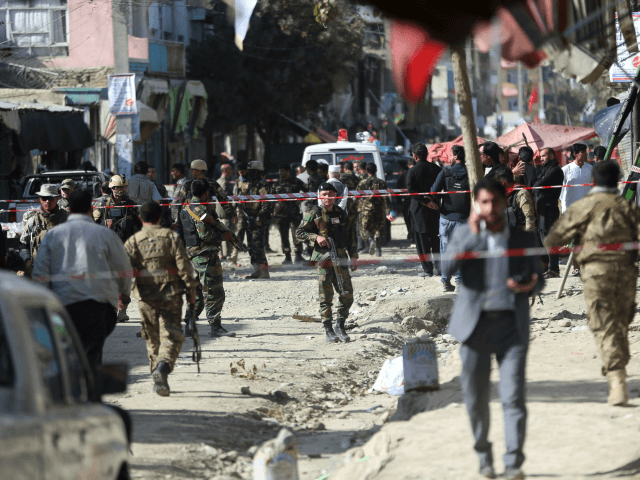A series of attacks in northern Afghanistan, where both the Taliban and Islamic State (ISIS/ISIL) have intensified their terror campaign, has prompted the International Committee of the Red Cross (ICRC) to “drastically reduce” its operations in the country.
“We have no choice but to drastically reduce our presence and activities in Afghanistan,” Monica Zanarelli, the ICRC head in Afghanistan, told reporters on Monday, only a couple of days after the U.S-NATO-led war against jihadists in the country entered its 17th year on October 7.
The decision by the charity group, which has been operating in Afghanistan for decades, is a testament to the growing dangers for aid workers in the country.
“This is a difficult moment for the ICRC and the staff. After 30 years of continuous presence in the country, we are reducing our presence and operations. But let’s be very clear, we are not leaving Afghanistan. Limiting our staff’s exposure to risks is our focus, all the while assisting the people affected by the conflict the best way we can,” declared the ICRC chief in a statement.
With an estimated 1,800 ICRC staffers in Afghanistan, including 120 international aid workers, the Red Cross’ operations in the country are its fourth largest worldwide.
ICRC revealed that it would close its offices in Faryab and Taliban hotbed Kunduz, both provinces in northern Afghanistan.
Meanwhile, it will “seriously” scale back its operations in Mazar-i-Sharif, the capital of northern Afghanistan’s Balkh province.
“We understand the consequences to stop our activities in the north, but we have no choice,” proclaimed Zanarelli.
“Exposure to risk has become our greater challenge in Afghanistan, and we know that zero risk doesn’t exist, and we are not aiming at that, but our security has to be guaranteed by every party,” she added in a statement.
In recent years, ICRC staff members in Afghanistan have been victims of terrorism despite being in the country to help injured and disabled people from all sides, assisting hospitals, making prison visits, as well as ensuring prisoners maintain contact with their families.
ICRC revealed in the statement:
In December 2016, an ICRC staff member was abducted in Kunduz province, and released four weeks later. This incident was followed by the brutal killing of six staff and the abduction of two others in Jawzjan province. After a seven-month-long ordeal, the two abducted staff were released on 5 September. Only six days after that, a physiotherapist was shot and killed by a long-term patient inside the rehabilitation centre in Mazar-i-Sharif.
The revelation that the Red Cross is downsizing its activities came as reports resurfaced about a possible truce between the Taliban and its alleged rival ISIS in Afghanistan.
According to Agence France-Presse (AFP) agency, both groups may be behind the attacks on the Red Cross in northern Afghanistan.
“The [ICRC] group has suffered a series of deadly attacks in northern Afghanistan, where Taliban and Islamic State group militants have intensified their assaults on police and troops,” reports AFP.
Citing unnamed sources, news outlets from the Afghanistan region claim Taliban chief Hebatullah Akhundzada has ordered his jihadists not to fight against its alleged rival the Islamic State.
Khaama Press (KP) points out that Akhundzada’s order “comes as bloody clashes continue in some parts of the country between the Taliban group and ISIS militants.”
Once again, the Taliban has denied any affiliation with ISIS, also considered an enemy by the Taliban’s ally al-Qaeda. ISIS broke away from ISIS in 2014.
Echoing the U.S. military, Radio Free Europe/Radio Liberty (RFE/RL) reported in August that ISIS and the Taliban worked together “in a rare joint operation” this year in northern Afghanistan’s Sar-e Pul Province.
Gen. John Nicholson, the top commander of U.S. and NATO troops in Afghanistan, has conceded that the two groups reached a ceasefire in eastern Nangarhar province last year, stressing that the agreement did not extend to the rest of the country.
At the time, the U.S. military considered Nangarhar to be ISIS’ only stronghold in the Afghanistan region.
However, the ISIS branch in Afghanistan has already expanded its jihadi operations from one to seven provinces, the United Nations recently reported.
The Taliban and its allies, namely the Haqqani Network, remain the most prominent jihadi threat in Afghanistan.
Taliban jihadists control or contest 45 percent of Afghanistan, revealed the Long War Journal (LWJ), a component of the Foundation for the Defense of Democracies (FDD) think-tank.
Breitbart News determined that the Taliban’s reach in Afghanistan is higher now than during any other time since the U.S. military deposed the group’s regime in late 2001.
Although the Taliban and ISIS have engaged in turf battles in Afghanistan since the latter group established a presence in the country in early 2015, some Afghan officials have repeatedly claimed that the two organizations have cooperated.

COMMENTS
Please let us know if you're having issues with commenting.